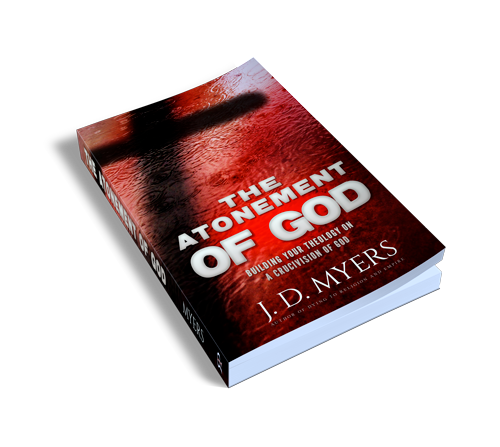My new book on the Non-Violent Atonement was released yesterday. It is called The Atonement of God, and you can (#AmazonAdLink) buy it on Amazon.
The book begins with a summary of three views on the atonement, and then I define and defend a fourth view, which is a Non-Violent view of the atonement.
The basic idea of a Non-Violent view of the atonement is that God did not want or need the death of Jesus in order to offer grace or forgiveness of sins. Yes, Jesus died a violent death, but it was not to satisfy an angry God. Instead, Jesus died for completely different reasons (which are explained in the book).
(#AmazonAdLink)  Following this explanation of the Non-Violent atonement, I provide 10 areas of theology that are affected by the Non-Violent atonement.
Following this explanation of the Non-Violent atonement, I provide 10 areas of theology that are affected by the Non-Violent atonement.
Here they are with a brief summary of each.
1. The Non-Violent Atonement Brings Continuity to the Life of Jesus
Everything Jesus did was Non-Violent. Yes, Jesus was aggressive, but He never harmed another human being, or encouraged others to do so. A Non-Violent atonement helps us see that Jesus what Jesus accomplished on the cross was right in line with the way He lived the rest of His life as well.
2. The Non-Violent Atonement Reveals the Truth about God
Does Jesus fully reveal God to us or not? Jesus claimed that He did, and other New Testament writers believed so as well John 1:14, 18; 14:9-11; 2 Cor 4:4; Php 2:6; Col 1:15; Heb 1:2-3.
But if God is violent, and Jesus does not reveal the violent side of God to us, this means that Jesus is a faulty revelation of God. The better option is to believe that Jesus does reveal God to us, and God looks just like a Non-Violent Jesus.
3. The Non-Violent Atonement Reveals the Truth about Scripture
But if God is Non-Violent like Jesus is Non-Violent, then what are we to do with all the violent portrayals of God in Scripture? I do not write them off as hopelessly in error. I continue to hold to an inerrantist position on Scripture, and argue that the violent portrayals of God in Scripture accurately reveal the heart of man instead of the heart of God.

4. The Non-Violent Atonement Reveals the Truth about Sacrifice
If Scripture reveals the heart of man instead of the heart of God, then this helps us make sense of the conflicting statements in Scripture about sacrifice. God does not want sacrifice and never did. We wanted it.
5. The Non-Violent Atonement Reveals the Truth about Humans
The truth from Scripture is that God is not violent, but humans are. We are the violent ones. And we justify our violence by blaming it on God.
6. The Non-Violent Atonement Reveals the Truth about Sin
The reason God tells us not to sin, is not because He is angry at us about sin, or will be angry with us if we sin. No, God tells us not to sin because in hurts and damages us. He loves us and does not want to see us hurt.

7. The Non-Violent Atonement Reveals the Truth about Forgiveness
God’s forgiveness has always been completely free. There have never been any conditions for God’s forgiveness. God does not need sacrifice in order to extend forgiveness. He simply forgives, just as Jesus does on the cross.
8. The Non-Violent Atonement Reveals the Truth about Justice
Christians often teach that “God is a God of love and forgiveness, but He is also a God of justice.” This chapter shows how wrong that idea is. Unconditional love and forgiveness are incompatible with justice. You can have one or the other, but you cannot have both.
9. The Non-Violent Atonement Reveals the Truth about Violence
As we begin to bring the book to a close, this chapter shows why God inspired a book (the Bible) which is so full of violence. The reason is because violence is such a huge human problem, God wanted to reveal that we humans are the source and cause of violence. We are in desperate need of this revelation from God, which is why God gave us the Bible.
10. The Non-Violent Atonement Reveals the Way to Peace
But if the violence is the problem, then peace is the cure. The Bible doesn’t just tell us that we are violent, but also shows us the way to peace, which is the way of love and forgiveness.
I am really excited about this book. Studying about the Non-Violent atonement and writing this book transformed my theology, and I know that if you read it, your life and theology will also be transformed. (#AmazonAdLink) Get your copy today on Amazon.
 How can a God who says "Love your enemies" (Matthew 5:44) be the same God who instructs His people in the Old Testament to kill their enemies?
How can a God who says "Love your enemies" (Matthew 5:44) be the same God who instructs His people in the Old Testament to kill their enemies?
These are the sorts of questions we discuss and (try to) answer in my online discipleship group. Members of the group can also take ALL of my online courses (Valued at over $1000) at no charge. Learn more here: Join the RedeemingGod.com Discipleship Group I can't wait to hear what you have to say, and how we can help you better understand God and learn to live like Him in this world!






 One thing that some people say to me is, “You can’t argue against God. His ways are higher than your ways; His thoughts higher than your thoughts. For, as Paul says in 1 Corinthians 2:16, ‘Who has known the mind of the Lord that he may instruct Him?'”
One thing that some people say to me is, “You can’t argue against God. His ways are higher than your ways; His thoughts higher than your thoughts. For, as Paul says in 1 Corinthians 2:16, ‘Who has known the mind of the Lord that he may instruct Him?'”
 As far as I can tell, the only real explanation is “We have the mind of Christ.” In other words, God led us here, by His Spirit, in opposition to various texts and passages in God’s Word.
As far as I can tell, the only real explanation is “We have the mind of Christ.” In other words, God led us here, by His Spirit, in opposition to various texts and passages in God’s Word. 





 In Joshua 6, Joshua leads the people of Israel in their first campaign against the Canaanites. This is the battle of Jericho. After the walls of Jericho fell down, Joshua instructs the people to go into the city and kill everything, including the women, children, and animals, and then burn everything (Joshua 6:17-24). The only people who were spared were those who accepted and helped the Israelite people, which in this case, consisted of a prostitute named Rahab and her family.
In Joshua 6, Joshua leads the people of Israel in their first campaign against the Canaanites. This is the battle of Jericho. After the walls of Jericho fell down, Joshua instructs the people to go into the city and kill everything, including the women, children, and animals, and then burn everything (Joshua 6:17-24). The only people who were spared were those who accepted and helped the Israelite people, which in this case, consisted of a prostitute named Rahab and her family.
 In Joshua 10, we have a long listing of all the groups of people that Joshua slaughtered. This list is so long, it carries over into Joshua 11.
In Joshua 10, we have a long listing of all the groups of people that Joshua slaughtered. This list is so long, it carries over into Joshua 11. The first Joshua sought to kill others in the name of God, while the second Joshua allowed Himself to be killed so that He might reveal God.
The first Joshua sought to kill others in the name of God, while the second Joshua allowed Himself to be killed so that He might reveal God.